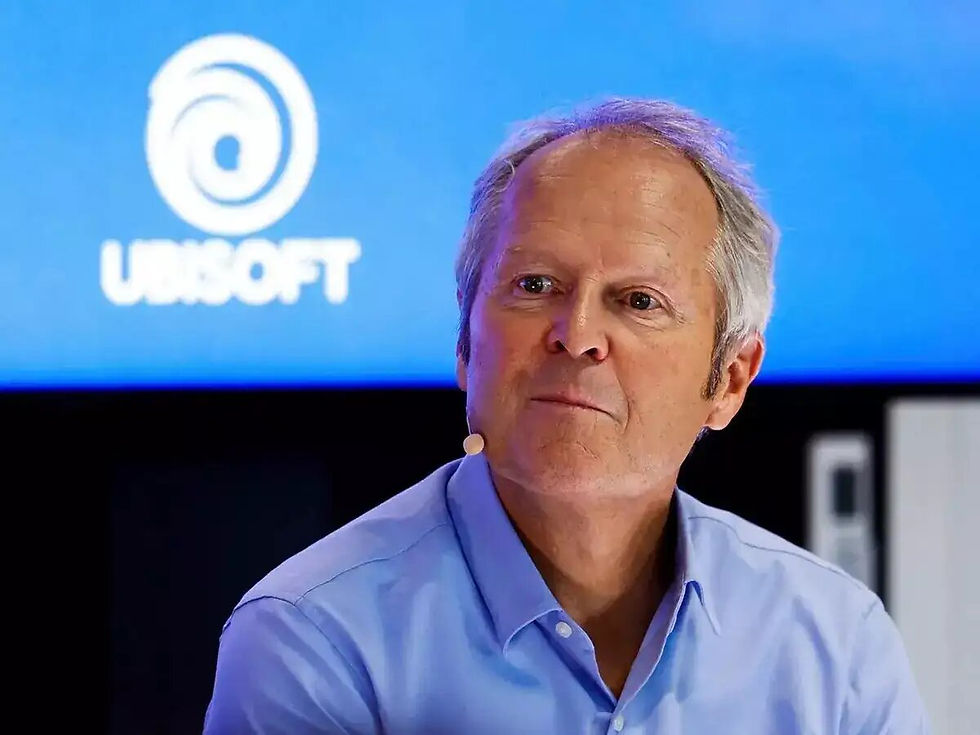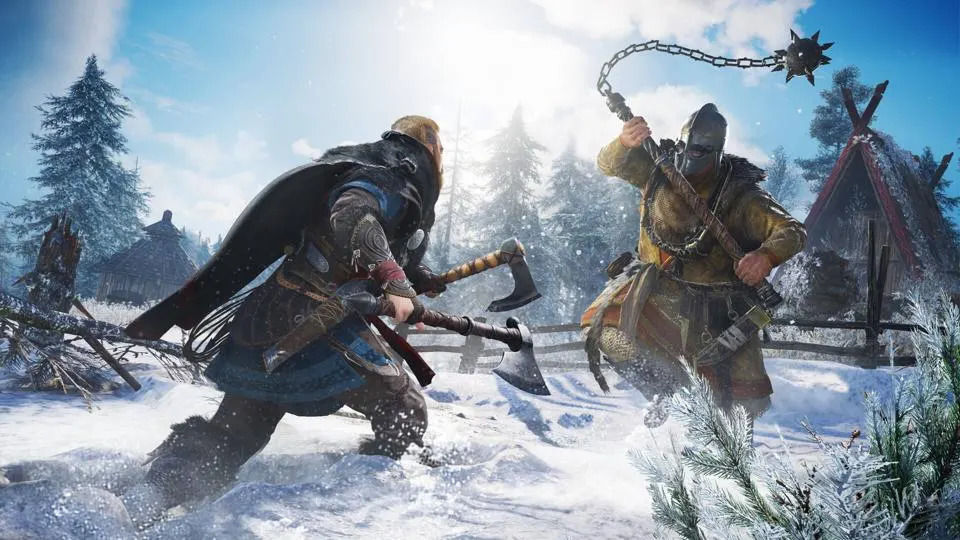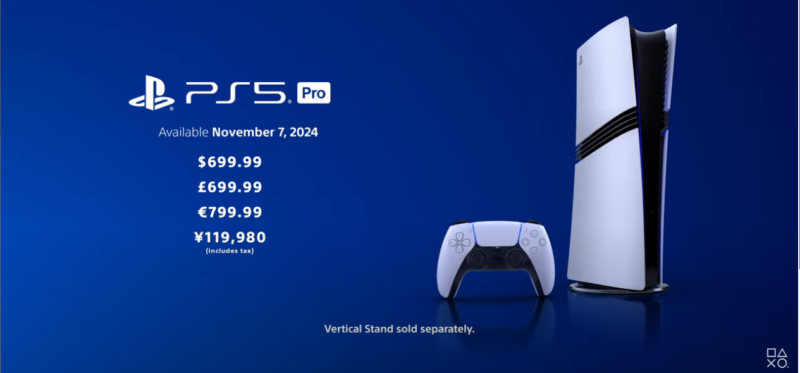What Assassin's Creed Shadows Means for Ubisoft
- Jonathan Frankel
- Feb 4, 2025
- 6 min read
by: Jonathan Frankel
Oh, Ubisoft. What was not too long ago a monolithic force of nature in the video games industry has fallen far from grace. The French video game publisher headed by controversial CEO Yves Guillemot has been stuck in some troubled waters since the launch of the current generation of consoles, with almost every major release failing to live up to sales expectations. Even titles attached to juggernaut intellectual properties that should’ve yielded guaranteed hits like Avatar: Frontiers of Pandora and Star Wars: Outlaws weren’t quite up to snuff critically or commercially. Add their misguided attempts at creating successful games-as-a-service (GaaS) titles like Skull and Bones and XDefiant to that list of disappointments, and it’s no wonder why the consumer has begun to lose faith in the once dominant AAA publisher. One constant that they’ve been able to reliably fall back on since 2007 however, is Assassin’s Creed, perhaps Ubisoft’s most important franchise, and one that may save them from a total buyout.

Suffice to say, Ubisoft has a lot riding on the next installment of their flagship franchise, Assassin’s Creed Shadows. Being developed by Ubisoft Quebec, Shadows promises to be the open world sandbox RPG of fans’ dreams by finally taking on the role of samurai and shinobi in the long-requested setting of Feudal Japan. Similar to 2015’s Assassin’s Creed Syndicate (also developed by Ubisoft Quebec), players will take on the roles of dual protagonists, Naoe and Yasuke, as they embark on an epic tale of honor and revenge. The shinobi Naoe represents the nimble, stealthy assassin side the series has come to be known for, while Yasuke acts as a heavier, unstoppable force utilizing his brute strength for an alternative combat-focused playstyle. I think I can speak for most players when I say this represents an interesting dynamic that will hopefully be used to great effect in terms of not only gameplay variety, but also in the context of the narrative. But of course, in our era of performative internet outrage, there are others who’d disagree.
A small but loud contingent of––*ahem*––Bad faith actors online have raised questions about the historical accuracy of Yasuke, the African samurai, lamenting Ubisoft’s decision to make one of the main characters a Black man. It wouldn’t even be worth mentioning the backlash of these bigoted internet pests if it weren’t for the fact that Ubisoft actually responded. Following repeated online harassment campaigns accusing the development team of “black-washing” and whining about Diversity, Equity, and Inclusion (DEI) efforts, Yves Guillemot thankfully clapped back. During an interview posted to Ubisoft’s official site about the state of the industry, Guillemot was asked about what dismays him about the games industry right now. He responded “One thing I am concerned about right now is the malicious and personal online attacks that have been directed at some of our team members and partners. I want to make it clear that we, at Ubisoft, condemn these hateful acts in the strongest possible terms, and I encourage the rest of the industry and players to denounce them, too.”

I like to think these internet chuds make up a vocal minority of actual players, so the impact of their disingenuous outrage should be minimal. It’s been proven time and time again that their mantra “go woke, go broke” is a fallacy, and that perceived political correctness has no real bearing on the success (or failure) of a video game. Take Baldur’s Gate III for example, one of the most universally beloved games of the past decade that also lets the player be a raging homosexual, black, trans woman of a completely alien species. The result of that wokeness? 15+ million copies sold, universal acclaim, and launching Larian Studios to industry stardom. The most salacious members of the online “culture war” community are now trying to convince people that Grand Theft Auto VI will fail because one of the protagonists is a Latina woman and some LGBTQ+ iconography has been spotted in promotional material. The notion that GTA VI will fail for any reason is absurd, but that it’s failure would be attributed to a female protagonist is straight-up delusional. If Assassin’s Creed Shadows fails to meet sales expectations, I promise the Black samurai and ninja lady will be the least of its problems. However, there are legitimate reasons to be skeptical of its success––namely the multiple delays––which may indicate a troubled development cycle.
Originally set to release in November 2024, the game was pushed back to February 2025 to give the team more time to polish what is supposedly the series’ most ambitious title to date. It was delayed once again to March 20, 2025, stating in an investor call, “This additional time will allow the team to better incorporate player feedback gathered over the past three months and help create the best conditions for launch by continuing to engage the increasingly positive Assassin’s Creed community.”
Audiences are generally more privy to the difficulties of video game development these days, and one additional month hardly seems like enough time to implement meaningful changes. The far likelier reason for the second delay (besides some minor extra refinement) is to get out of the way of February’s exceptionally jam-packed release schedule. Not only are other megaton RPGs like Avowed and Kingdom Come: Deliverance II dropping in February, but heavy hitters like Civilization VII and Monster Hunter Wilds also threaten to take up the majority of many players’ time (and money). If Ubisoft wants to position Shadows to make the biggest splash at launch as possible, getting the heck out of dodge by moving to the end of March is probably a shrewd move.
For context, let’s take a look at some of the more recent entries in the franchise. At the launch of the new generation of consoles, Assassin’s Creed Valhalla was released right alongside them, offering players a massive open worlder to get lost in on their shiny new machines. Despite the mainstream criticism bemoaning its overstuffed, quality-over-quantity nature, it wound up selling a whopping 20+ million copies, grossing over $1 billion in revenue. But surely its success has more to do with its launch title status, and less to do with its own merit, right? WRONG.

The last game to come out, 2023’s Assassin’s Creed Mirage, promised a return to form for the series fans fell in love with in the first place. It withdrew from the bloated open world RPG formula it had been using since 2017’s Origins in favor of a more traditional, focused AC experience, acting as a sort of interstitial title while the A-team cooks up the next *Big One*. It was promoted as such and was sold at a budget-friendly price of $50 at launch as opposed to the now-industry standard $70 for AAA releases, meaning there was little expectation that it’d break any records. But yet again, Ubisoft’s trusty golden cow generated a healthy $300 million after selling more than 5 million copies since its release regardless of a tepid critical response.
Despite the success of their recent AC outings, however, Ubisoft has been facing numerous internal issues resulting in layoffs and studio closures left and right due to plummeting stock prices for the past few years. They’re not too popular with the consumer either after shutting down their Montpellier studio who made the critically lauded Prince of Persia: The Lost Crown in 2024 to softer than projected sales numbers, and being the internet’s punching bag since the release of their pirate-themed GaaS Skull and Bones for which they get endlessly mocked to this day by referring to it as a “AAAA” title.
There’s a considerable amount of people rooting for Ubisoft to fail––whether that scorn is justified or not makes no difference––but it’s enough that they're certainly facing an uphill battle in their mission to please everyone. I’m no economic analyst (clearly). I don’t know how many copies sold or billions in revenue they’d need to make in order to stay afloat without a Chinese megacorporation like Tencent stepping in to stabilize the company.

Personally, I don’t particularly care what happens to Ubisoft. It’s a corporation, and corporations simply aren’t deserving of our empathy. I do, however, care about the people toiling away trying to make the best art possible at what is ostensibly their dream jobs, only to be rewarded by a swift kick to the curb. I love the Assassin's Creed franchise and I sincerely hope Shadows is everything I want it to be, but it's not worth livelihoods being destroyed because of late-stage capitalism. If a Tencent takeover is what it takes to end the cycle of honest lives upended in the pursuit of infinite growth, then so be it.



Comments